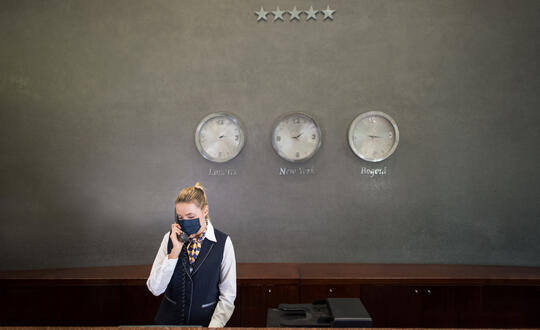
A hotel management agreement (HMA) is the core document governing the relationship between hotel owners and operators/managers. In a subsector of the commercial real estate industry particularly hard hit by COVID-19 disruptions, this relationship is being tested in unique ways.
With the trough of the pandemic not having been reached, it is too early to predict permanent changes to the owner-manager relationship which may be reflected in future HMAs. Hotel brands may be able to offer owners short-term relief under franchise and management agreements, to test performance returns on an incremental basis without the need for sweeping document modifications. However, there are some long-term effects stemming from the disruption of COVID-19 that are likely to materialise.
Our comments reflect the perspective of UK Hospitality Sector Lead Claire Wilkinson, and, US Real Estate Sector Lead Joe Foltz.
Owners are usually private landowners/developers who own the hotel building, whereas managers (also known as operators) will be responsible for the day to day management of the hotel. Some owners do self-manage, but the majority of owners will pass the management responsibilities of the hotel to an operators.
At the threshold, perspectives of the parties should be identified and considered. Managers may be third party-affiliated, or unaffiliated with the owner or the franchise brand; unaffiliated managers are known as "white label" managers in the UK. Owners and managers will have different aims and objectives; these objectives align in respect of some issues, but will diverge on others. We examine some of these core themes in light of COVID-19, and the respective interests of the owner and operator, below.
Management fees
Base and incentive management fees paid to managers are contingent on the success of the hotel. However, base fees are usually are based on a percentage of revenue, whereas incentive fees are more typically expressed as a percentage of profit. Given the COVID-19 pandemic, both types of management fee will have seen a sharp decline.
COVID-19 has affected both owners and managers in the context of fees. A number of third party and brand management companies are currently foregoing revenue-based fee income in respect of their managed or franchised properties as a result of such properties being shuttered, while owners are continuing to pay for management of hotels which are closed to the public.
Following the COVID-19 pandemic, it is possible that managers may request, a minimum fee not linked to performance to cover their overhead and general operating expenses in the event of further closures. In addition, base and incentive management fee structures may be revisited as owners and managers alike struggle to return to profitable levels.
Rather than a fixed base management fee of, for example 3% of revenue, we may see the introduction of ramped or stepped fees increasing each year, for example 1.5% in year 1, 2% in year 2 and 3% in year 3. Such an arrangement echoes the ramp-up of royalties for new properties under franchise agreements. Likewise, the incentive fee formula may be subject to such a ramp-up.
With no revenue and no clear ability to predict when hotels will return to profitable levels, incentive management fees may be irrelevant for some period of time. During such a period, a minimum fee may be more appealing to the management company, third party or brand, to cover their overhead costs. Looking further ahead, we may see a shift in the values of managers to favour base fees, rather than incentive fees, due to the financial certainty base fees offer. This would be a significant change in approach, particularly in the UK, as incentive fees have largely been industry standard.
Risk allocation
The allocation of risk has always been a key element of the relationship between owners and managers, with managers preferring owners to assume increasing levels of responsibility for the risks associated with the performance and operation of a hotel. Managers have, for example, required owners to procure insurance to cover management liabilities at the owner’s expense, including employer liability insurance.
Management companies, particularly brand managers, have required broad indemnification from owners, excluding only specific instances of gross negligence or wilful misconduct on the part of the manager. One issue that is particularly relevant during the pandemic is that of hotel employees. The key question as we consider a post-COVID-19 landscape is that of who will bear the risk of illness to guests or employees with re-opening after COVID? Are comprehensive liability insurance carriers or employer liability insurance carriers going to provide insurance for this risk? Even if management companies agree that the employees at the property are their responsibility, rather than the responsibility of the owner, it is likely that they will attempt exclude any liability for COVID-related illness or death, and may expect the owners to insure against such losses.
In the U.S., where owners are likely to continue to favor hotel personnel being treated as employees of the manager, the additional costs associated with insuring pandemic-related liabilities will need to be addressed with managers to protect the owner's return. In the UK and Europe, owners tend to be named as employers of the hotel personnel; we may see this approach being considered in the context of the allocation of risk in the U.S. going forward.
Force majeure
A number of HMAs do not include a pandemic as an event of force majeure. At best, they refer to "events beyond the reasonable control" of the owner or manager, which, although arguably would cover a pandemic, is far from specific. The scope of force majeure clauses, particularly in the UK, is typically approached with a narrow interpretation by the Courts.
Some brand management agreements and HMAs do include as events of force majeure “epidemics, quarantine or any other public health restrictions or public health advisories…” and allow the manager in consultation with the owner to close the hotel and possibly terminate the agreement.
In either event, HMAs are clear that in the majority of cases, a force majeure event does not relieve an owner of payment obligations.
Future HMAs will, in all likelihood, expressly include pandemics as force majeure events, with issues such as which payment obligations should remain in such event, and which party has the authority to close the property, now open for negotiation between the parties when HMAs are drafted.
Employment matters
In the US, brand management and third party HMAs stipulate that hotel personnel will be designated as manager's employees. In parallel to this designation, managers often require owners to maintain employer liability insurance to cover liability to which a manager may be subject arising from employee conduct.
There are a number of questions that are likely to arise regarding the scope of employer liability insurance following the COVID-19 pandemic. In the future, will employer liability policies cover the risk of employee exposure to COVID-like pandemic risk? Similarly, will such insurance cover the risk of guest infections from employee contact? Will all employees and employees be required to be tested for infectious disease? And, of arguably most concern, is the manager or owner liable for infections suffered by guests or employees?
Risks that are not covered by insurance will be the subject of cross indemnifications. These will be more hotly negotiated than ever, with each of owner and manager keen to avoid liability for such events.
How privacy regulations and concerns are addressed in the aftermath of COVID-19 will also be crucial, particularly if compulsory health or temperature testing is required.
In jurisdictions where employees are unionised, collective bargaining agreements will address employee health rights. Unions will lobby governmental authorities for health and payment protections for workers who are subject to infection risk. On a more practical level, unions may advocate for more cleaning staff per room while owners are likely to attempt to resist the additional labour costs.
Closure and suspension provisions
Closure or suspension of the hotel is frequently not addressed in HMAs. When considered in the context of in brand management HMAs, the common position is that the manager determines whether a hotel should close; this decision is usually made in consultation with the owner. This is also the case with re-opening.
The manager will be mindful of protecting the brand reputation, as well as the safety and feasibility of the general management of the property, and will therefore want to retain this decision-making for the greater control it offers. After COVID-19, we expect to see language allowing the manager to close the hotel in response to governmental guidance.
Owner/operator relationship
After experiencing COVID-19 shutdowns, owners will be looking for profitable revenues from all sources. Managers will have the same interest, within the bounds of safe operation for employees and guests.
We expect to see managers negotiate for increased control over hours of operation, food and beverage service, spa and ancillary guest services. Budgets will be tightly scrutinised, and managers may be given less latitude on deviations for capital expenditure and other budget line items.
Brands may be viewed by the public as safer than independent, "white brand" properties, and therefore expansion from core brands seems likely. The proliferation of sub-brands within major chains may reverse, with loyalty programs and the appeal of a 'household name' drawing clientele to the established brands.
With increased concerns regarding employee health and conduct following the pandemic, managers may seek to shift more employee liability to owners, either by specific contractual provisions or designation as co-employers. What is not covered by employee liability insurance will be the subject of cross indemnifications; something which both parties will want to limit.
Future challenges to HMA
If the result of COVID-19 leads to a shift in favour of branded properties by business and leisure travellers, the number of brand-managed properties will increase accordingly. Owners will, in turn, have less flexibility in negotiating terms with managers. However, in a tight revenue environment, owners may seek to reduce the cost of franchise royalty fees and marketing costs, and third party manager can offer reduced fee structures to ownership. This tension will play out in the coming months and will be subject to how quickly owners are able to recover income.
Alternative lodging concepts like OYO and AirBnB may take longer to recover from the effects of the pandemic, especially given guests will be wary of cleaning and health standards private owners maintain at their properties.There may be an opportunity for third party managers to establish a reputation as specialists in sanitising and managing OYO and AirBnB assets, as well as pushing to establish a national management branding. Alternatively, one of the existing global brand management companies may take the opportunity to step into the space.
This article is for general information only and reflects the position at the date of publication. It does not constitute legal advice.




